
This review may contain spoilers
Strictly speaking from someone who has not read the manga, the movie is generally cute. The teacher/ student love position will likely be a source of contention for people before you even get like 20% into the story. If you can get over that, this is a pretty decent movie. I will say you can tell that it feels like exposition is missing due to the speed of character interactions. Like Suzume and Yuyuka becoming friends so fast. Or Mamura liking Suzume feeling like the build up was missing. Especially during the Christmas scene, it didn't feel like it make any sense why he liked her. There was no build up to show that next to a few lingering looks. You hooks argue it was just implied but it wasn't strong enough in my opinion. I'm assuming there's scenes in the source material that shows that. So being one of the main relationships, it felt underwhelming. The relationship between Suzume and the Sensei also felt the same. Not enough definition of why. So this being the main story kinda broke the immersion.
Yukichi's confrontation with Satsuki also didn't feel strong because he spoke as if we had pretense to his and Suzume's relationship. We saw nothing of Yukichi's interactions with Suzume's to indicate if this was true. He totally felt like a throwaway character especially because they never really revealed what him and Satsuki talked about near the end.
Mei for me was definitely the right person to choose for this main role however. She's the perfect person to play a naive but emotional character. She has this perpetual look of confusion. Definitely felt like a manga heroine. She was ahead of everyone in terms of acting capability in this movie. She felt the most believable. There were tons of scenes with awkward interactions but for the most part Mei kept it grounded.
Now let's talk about the cinematography. It's very well done. The one thing about Japanese movies is when they do lighting well it has a totally different feel to western movies. The sense of a special moment or place in time getting captured in isolation was featured really well in this movie. The Christmas tree scene or the night time conversation between Mamura and Suzume come to mind.
I suppose this may also come from the manga panels framing key sequences to emphasize their importance and translating it over to live action. But there are some really pretty shots in this movie. It helps the movie's overall appeal since some of the relationships don't truly have good reasoning.
The music is very cute as well. I can't really remember much of the music but I can tell you it made me cheerful. The race theme was very dramatic though! And the ending theme is very bubbly.
I think if you are just looking for a nice movie to throw on, this would be a good candidate.
Was this review helpful to you?

This review may contain spoilers
One day under that brilliant dawn
When I was watching this show, all I could think of was "I wish I came across this show earlier in my life."A story with a title like this, you expect to eyeroll at the contrivances and silly over the top melodrama. However this show felt different in what it was trying to get across.
The show wasn't so much about the love triangles and tension. It was more about the story of moving towards a path in life that you can be happy about.
When the story reached its finale points, I felt that I grew along side the characters. Each one felt like they overcame something large in their lives. Oto gained her independence and strength. Ren allowed himself to express his feelings. Rihoko allowed herself to be herself. Konatsu gained her confidence. Haruta gained self esteem. Asahi gained compassion and understanding. I really enjoyed each characters arc. I liked how each of them were allowed breathing room to expand their characters. No matter how they got there, their actions made more sense as the show went on.
I felt that the characterization was on point for the majority of the show. It's funny because I'm used to Kengo being a heel in his roles and was surprised to see him as a quiet reluctant man. But then the swerve hit and I was like "ahh there it is!" Arimura was my favourite part of the show. But I'm biased towards her. She tends to run a through a gamut of emotions in all her roles. I really liked her chemistry with the cast. Especially with Kengo, they had amazing body language chemistry. Kentarou felt a little scattered but when you start to realize his character's quirks, it makes it more reasonable.
Aoi felt really great in her portrayal of someone who judges others because of her own weaknesses. With Mitsuki, I loved how her character didn't become catty or violent. The fact that she settled into the chill friend was amazing. And finally Takahiro, he felt nuanced. At first I didn't really like him. As the show went on I stayed feeling really bad for him. Then I felt like he was being too uncaring but the I was back on his side later. It felt like a rollercoaster with his character. Special shout out to Issey playing the guy with a chip on his shoulder and Mei Nagano as a cute support.
Also just a mention about the show's great mirroring. There's a good amount of scenes mirroring how similar the stories of Oto and Ren are. From what they are doing when they are texting to how they perceive people. It really showed an unspoken bond between the characters. I also liked how paper played a role in emotional damage.
It was also kinda funny because I heard the piano score and recently came off of "Umi no Hajimari"only to say to myself "This sounds so similar... " only to find out its the same composer. So if you enjoyed that Soundtrack, it's more or less the same.
The cinematography was fine for what it was. I particularly enjoyed many of the overhead shots and nights capes. The opening moments of episode 1 was also an interesting way of introducing everyone. There's some lighting issues with the general Japan way of doing the blown out sunlit characters. Either the that, it was good. A good thing about the camera work was it was always sort of moving. It created an engaging flow. There some conversations hurt by the camera however jumping back and forth so much between characters.
Overall a really piercing watch. I think I cried every episode(The mom's note 😭). But a lot of things just hit so strongly. I think because the main core of the show is the struggle to make something of yourself. And that's something we all can relate to.
P. S that ending song is one of the sweetest songs I've heard. After you finish the series, watch the music video.
Was this review helpful to you?

This review may contain spoilers
A slowly placed uneven drama
The first thing to mention is the plot is a little strange. Is it common to come back to high school to help a old teacher with something in Japan? I know the schooling is very different in Japan and you have you have more obligations but the setup was a little random. I guess from a standpoint of helping out old friends it makes sense but then they added in the random swerve of Yuzuko's story!I get that it's sort of a parallel to Kudo's story and showing what maybe would have happened to her if Hayama didn't take interest in her. But it's really just a plot device to move the story along. It felt really out of place. The pacing and plot lines shuffle a little bit too much in this story. Thus creating an uneven watching experience. Somethings happen at a snails pace. While others are in fast forwards like the relationship with Ono and Kudo.
Now there are some morality issues in this one. A teacher having a relationship with a high school student, despite things only becoming inappropriate after graduation. It's at first shown that Kudo is the unrequited love but then after the kiss scene all gloves are off.
Some may have issues with this romance situation. Especially during their final scenes together, we have a very emotional sex scene that is stark contrast to the other sex scene. This scene however directly comes after a scene with exposition that would make the sex between Hayama and Kudo controversial.
The movie skirts the line on morality a bunch with how these things play out. We don't need to necessarily feel like these are good decisions but they are there to inform us how these characters are themselves flawed.
And unfortunately the second relationship doesn't fair much better.
The main issue I have with this movie is the lack of chemistry. The two main leads Jun and Kasumi really don't have too much going for them. I didn't really feel like they had any sort of connection. Some actors just don't really get that spark together. They may have acted fine individually but I couldn't feel that rapport. The ending of the movie kinda proves this point that the love they shared was different but it surely will be controversial to a lot of people.
I've watched Kentarou and Kasumi in all their performances together in reverse order and this was by far their most physical but also most lacking in chemistry. But that's mainly due to the type of relationship they have in this. It's very unhealthy. I honestly wasn't expecting that sort of outcome. So I guess that's one positive to this story. That nothing ends positively lol.
The cinematography of the movie is fairly ok. There's a lot of rain shots and sometimes what I consider a few artsy shots. The movie has a fairly nostalgic tone over the film as well due to the flashbacks. There's also the classic blown out white light that's so common in Japanese media lol. The music is mostly nostalgic or sad piano.
Overall I'm not sure this is one worth watching personally.
Was this review helpful to you?
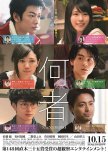
This review may contain spoilers
Please tell us something about yourself in 1 minute.
A frustrating watch to be honest. Not because of the movie itself. More so the themes behind the movie are so true and harsh.The theme of this movie seems to be about how we are just expected to be someone as soon as we enter the job market in society. In Japan, it is a big deal to land a good job and if you do it must be with a company. Those jobs pretty much mean you are there for life. It's generally looked down upon taking up jobs that aren't with giant companies and leaving such jobs is also a very big faux pas. Therefor work culture in Japan can sometimes be toxic and leave many people in disarray during the job hunt.
We come across 5 individuals all looking for that release. When they will find the job that will make them a productive member of society. Each one has a goal in mind to find the job but they are extremely reluctant to do so. Many of them end up having to compromise in order not to feel failure. Failure is a large component of this movie. In fact the main Protagonist Takuto somewhat revels in it. And this is where the movie becomes extremely frustrating.
Takuto is always analyzing his peers and making his judgements on their decisions. His character is majorly flawed in that he has totally been crushed by the world and doesn't take responsibility for his own downfalls. This creates a large vacuum of despair within himself. It's as if his self loathing is projected onto his friends. We learn at the end about what he's really been thinking the entire movie and it's awful. As someone who has had issues in the past comparing themselves to others, I can understand where he's coming from. We attack because we lack awareness of our own vulnerabilities. It's one of the reasons it's hard to watch this for me. We know he knows that he isn't amounting to anything but he can't express it himself anymore.
A largely trapped feeling that dwells on past stories.
The other characters are parallels of this journey. Mizuki who has to grow up in order to protect her parents who she feels she owes. Kotaro the drive less musician who has to move on in order to survive. Despite this he continues to head toward a goal that seems almost implausible. Rica who wants to do good in the world and does everything she can to make herself heard. And finally Takayoshi who has already decided that the world is beneath him and he doesn't want to live in such a world that breaks someone's individuality. All of these characters represent many repressed feelings of youth who are growing up in such a society that values you more as a number then a person. The main cast all present themselves in a way that represents a role in Takuto's mind play. People who hide their insecurities and sadness behind walls. They are all equally disgraceful in his eyes. But we watch on as entertainment. So then the question the movie asks is how can we be so blind to these feelings?
Visually the film is well shot and there's some really good tight shots and the stage play shots are really inventive. A lot of the film focuses on subtle little cues. Like the shuffling of a phone or the eyes of Takuto making his analysis of his friends.Body language is also very telling in this story. There's a major difference in how let's say Kotaro, Takayoshi and Takuto present themselves. Takeru Satoh has this innate ability to portray a devilish quality behind his acting. It's kinda like that swarmy evil underbelly of someone . In this movie it makes him pretty unlikable as a character. Kasumi once again steals the show with her distant emotional breaks. I think she had the best scenes in the movie.
I would say this movie is ok to watch when you just maybe feel a little sad. It's mood is definitely subdued with it's warm intense lighting. It uses a lot of techniques that stage plays use I thought. So it has a lot of spotlights and colored lighting to convey tones.
Finally the film expresses the one true thing we all know. Twitter is a dumpster fire.
Was this review helpful to you?
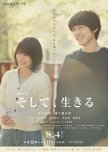
This review may contain spoilers
Continue on
I want to say what a beautiful piece of media this is! A delicate story of life and balance. Despite what may happen in the story, the answer is always to move forward with a smile.The actors have great chemistry. Kentarou and Kasumi lead the cast with their amazing body language and melancholic stares. These two are undeniably great together. If you have seen Sayonara no Tsuzuki, it's almost like watching a seemingly parallel relationship play out. Kasumi always has this expression I call the "Arimura stare." It's when she stares off to the side looking down as if she's looking through time and space.
A lot of things happen in this story to poor Toko. Arimura was the right choice in depicting such a flurry of emotional turmoil and strength. I tend to find she takes on roles a lot where her character is constantly being pulled in many directions, only for her to stand her ground and make her own decisions about what's best for her. That's why I'm so drawn to her roles. She expertly has honed this very specialized talent of the listless soul searching for meaning.
Kentarou plays his part with a gentle nature and ease. His outburst feel more emotional as his character is so reserved. I liked that about his acting. Whenever he was dealing with things, his body language would become awkward and stiff. Thus allowing him to fully express his inhibitions.
I was also enamoured with Kang Ji Young as Han. I loved her acting and smoothness. Each of her scenes felt really relaxed. The dynamic she had with both Toko and Kiyotaka was great!
Amane's part as Shinji was a little jarring at first as an insert rival but he came around. I think Shinji and Toko needed more interactions to make me understand the relationship better. Kiyotaka and Han felt more fleshed out and had better layers built upon it. So I didn't quite feel that much for Shinji. He was a plucky underdog that in the end lost but not forever. His tragedy seemed to be an amalgamation of trying to work your hardest but still losing in the end. Which I think is important in this particular story. He didn't get a fairytale ending. He hid things and lashed out due to all the stress. A trait that many in Japanese society can understand I'm sure.
I liked that this story started with tragedy and then ended with bittersweet ending. There's so many things that happen in this story that feels like a train wreck. It's almost just bad news after bad news that these poor people endure. But I appreciated that they handled each story well. I was not expecting the story to feature the Philippines. That segment took such a drastic turn of events!
Each story I felt had a important message about rebuilding and supporting each other through tough times. I think that's what made me really enjoy this story. Hardships we endure and the power to move forward is something that Japan heavily focuses on. It's a strength of Japanese media. Soshite ikiru is trying to tell us to not dwell on the negatives because we are still here in the end. Things may come and go but we can find happiness in how those hardships led us to the things we have now.
In the end we can always strive to move forward.
Was this review helpful to you?
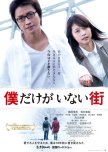
This review may contain spoilers
Time and time again
Honestly it's hard to really say much about this movie.At first it's ok and intriguing. Then as the movie progresses it just starts getting silly.
The acting by the young actors are great. The older adults come across as phoning in the roles honestly.
I didn't like Satoru's depth at all. His acting didn't seem believable and I just couldn't get behind how he was reacting to situations. Like when his mom was killed what sort of reaction was that?? Katagiri was also just kinda there and the ending had no impact due to their undefined relationship. There was not enough build to make it matter. They all felt too mellow in their scenes and it made the movie feel like nothing significant was happening.
I also don't understand how situations played out. We have an adult in a kid's body, yet his logic during key scenes was like not to speak up or defend himself. The acting of Kayo's parents also seemed to be so dissonant from the scenes. I don't know how to explain it. They weren't acting at the other actors, they were just playing out the scene if that makes sense.
The pacing and plot were ok for the most part but as everyone else said the last 20 mins is just absurd. Let's just go to a super high roof alone with the killer.
Was this review helpful to you?

This review may contain spoilers
We never should feel bad for a life we lived.
I fell in love with these characters over the course of this 10 episode series. Despite the main theme of the story being something that is brought up a ton in Japanese media, this story felt fresh and unique.Having the story set up about the life of struggling comedians was a great idea. I loved Haruto's blunt nature, Shunta's infectious spirit and Junbei's unwavering quirkyness. Each of these characters felt so natural in their interactions with their banter being the highlight. Sometimes the dumb jokes were nonsensical but that's what makes this more believable. The fact that the jokes they had with each other didn't seem that funny to me spoke volumes about how realistic the friendship was. These are stupid little jokes only they would find hilarious. I really liked that aspect and was able to laugh along as they really made no sense to me. The sketches were beyond crazy. I had no idea what I was watching half the time lol. Make sure you stay until the end of the credits as they finish the sketches.I did find comfort in them just like how Rihoko did however.
Rihoko and Tsumugi had an important part to play as well. I resonated with both of their struggles as they hit really close to home. Rihoko is brilliantly acted by Arimura Kasumi and Tsumugi by Kotone Furukawa. I've seen these two together in so many shows now, it makes sense why they are paired together. They have wonderful chemistry. Rihoko probably has the most dramatic scenes in the series and steals the show whenever they pull one out. Tsumugi felt a little more one sided until they opened up about what her character was experiencing and it felt all too real. I thought her character had the most interesting reason for being the way she was. I will include Natsumi in this as well. Natsumi was a cutie, and I want all the best things for her. Her character motivations and demeanor were so wholesome. I really liked that there was practically no drama with her relationship with Everyone. I was half expecting a burst of emotion at the events but it was tempered with the story.
I also liked for the most part that the series is so light hearted despite such heavy subjects as suicide, life goals, mlms and failures. The themes resonate with anyone who are now in the midst of their adult years. I felt joy, sorrow and appreciation for how they depicted so many different subjects with pillowy tact. The show respects that things aren't really bad or good in all aspects and that was a core takeaway. We don't need to normalize taking the opposite route of everyone else is a bad thing. As long as we have faith in ourselves, it wasn't for nothing.
Sometimes it's ok to take the road less travelled if it means getting you closer to who you want to be.
Was this review helpful to you?

This review may contain spoilers
This is just all over the place
Quick preface by saying I have not read the manga.I tried to give this movie the benefit of the doubt. Sometimes we can take movies at face value and just turn our brains off and enjoy, but this movie is messy in its execution.
The acting is all over the place. Momo the main character is carelessly thrown about with no real reason for character growth. Her goals and grievances are very haphazard. It doesn't help that her acting is not very believable. It's hard to root for her when you don't feel any sort of attachment. The crying scenes especially felt very off. Like the crying was good the emotion seemed misplaced if that makes sense?
The movie also seems to focus way more on Kairi then her. Kairi's story is decently ok but he is extremely irritating. His family acts so hilariously like typical drama family that none of it feels like it matters. The father especially feels like a completely different story is going on. Toji is extremely just there to be cool. And Sae is just a maniac with no good reason to actually hate Momo. I like both Mackenyu and Mei so it was disappointing seeing their characters so one sided. I also think the cast had really bad chemistry together. Every interaction felt extremely forced or awkward.
Each plot point just goes so quickly and there seems little build up to these characters. It's like they were just rushing to get to each plot point. Every new plot introduced just made it feel like this would of been better as series. There seems to to be a lot missing perhaps found in the manga. This hurt the pacing quite a bit as they tried to cram so much into the movie.
Not recommended at all.
Was this review helpful to you?
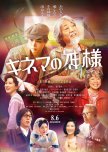
This review may contain spoilers
Grant me this wish God of cinema
As a lover of period pieces, I was looking forward to the setting of this movie. While the movie itself mostly takes place in the present, I found it hard to really get to grasp onto the characters struggles.The main issue I had with was the lack of build between Yoshiko and Gou. I found that they lacked chemistry and that the story didn't actually touch too much on why they liked each other. Being the main core of this story, I couldn't help but feel disconnected from the story as their relationship was poorly put together. Gou and Terashin had much more impactful scenes together that made their relationship feel well thought out. Gou was probably the best realized as a character and his younger self had a good amount of the same characterizations. Yoshiko felt like two different characters, which makes sense in context of the story but was not really expanded. The film also does a little tongue and cheek nod about not explaining things and letting audiences figure things out themselves and I felt like this movie was that the whole way.
There was something also off about Yuta and Ayumi as well. Yuta, I'm not sure if his character was meant to be that awkward but he was really stiff in all of his line deliveries. His character kinda came off as someone with issues due to his disfunctional family. But he's just kinda there. Eventually his story plays an important part in getting things together but they don't really do much with that plot point. Ayumi also I felt didn't quite live up the daughter. I'm not sure if this was due to lack of chemistry but the cast to me didn't click as a family unit. She just didn't seem as upset in certain scenes or was really kind of phoning it in. Her most powerful scene was sitting the speech but even then it felt underwhelming. I understand that was one of the plot points but it seemed very haphazard.
The plot Itself was easy enough to follow, but there was a few odd swerves it took. I think the main issues were just the pacing and story didn't feel like it earned the emotional moments. The only scene that seemed to really get to me is when Yoshiko and Gou are reminiscing over a photo of her and when Sonoka does her final scene. The acceptance speech as well. That's when I think we truly get the movies' purpose of repentance. But I think it would of landed better off they spent a little more time on the Family dynamic.
Interestingly enough Covid came into play into this story. This movie came into theatres in 2021. So it seems it may have been unfortunately a casualty during the filming shutdowns and barriers due to social distancing. I wonder if this affected the movie's script?
I'm not sure I would recommend this movie overall.
Was this review helpful to you?

This review may contain spoilers
I just want to be a normal office lady
This is one of the silliest movies I've watched. The fact that this isn't a manga adaptation is hilarious. The movie itself goes through a typical shonen manga arc. It even explicitly tells you they based the whole story on manga arcs revolving Yanki men. I loved watching the cast, you could tell they were having fun indulging in this silly world. The movie had good comedic timing and a lot of the actors played their parts humorously. I particularly liked Shuri, Etsuko and Shiori.The fights in the movie are silly and surprisingly mobile with their long skirts. They aren't amazing action sequences but they at least are fun to watch. It's really hard to take Mei Nagano seriously as a combatant due to her demeanor, but that's what's so fun about this production. I loved seeing this angry side of her. Alice was a hearthrob! I loved her hero like energy and style. The bosses of Tomsun were absolutely hilarious. I loved how the boss was so typical of a silly anime villain. I loved the aura of Reina and they really played that up with her speaking mannerisms.
The production had some fun cinematography, with it's comedic cuts and vibrant bright lighting. The music coming in every time a big fight happened was fun. The plot is super nonsensical and should just be ignored lol.You came here to watch ladies beat the tar out of each other and that's what you get. I thought it was so silly how a lot of fights ended with the same scars on certain characters.
Just turn your brain off and enjoy the idea.
Was this review helpful to you?

This review may contain spoilers
A drama where no one wins
Motherhood is hard to watch. Many of the characters go through such demanding circumstances that you feel generally bad all around. Though through innovative storytelling we unravel the many failings of displaced trauma. The story is told into two view points. We initially see the mother's side of what she thought happened. Then we are treated with what the daughter experienced. Now the question is, which is the correct reliable narrator?Storywise, the grandma's offer two distinct types: the over bearing hater and the gentle enabler. What I liked about this story is that they show the issues with both these sides of motherhood. Despite Rumiko growing up with a caring mother, she developed a complex to only please her mother and others above herself. Meanwhile Rumiko's mother in law is a straight up maniac. Just constantly degrading Rumiko and coddling Ritsuko while ignoring her son's plight in his younger years. The movie scathingly shows up how neither is sustainable on a child in the long run. Rumiko's mother in law is played so convincingly harpy like it's hard not to hate her. That was impressive act. While Rumiko's mother was shown with such a gentle nurturing side. She was like a ideal mother in terms of composure and warmth, which made her final scene heart wrenching.
Erika Toda herself reminds me of Shelly Duvall. She has a gentleness that comes off as a ticking time bomb. Where her emotions are just seething slightly below the surface. There were many times I was expecting her to just explode at her daughter. During her scenes, Rumiko I felt had a really interesting way of speaking about how she was trying to keep things together. It was in her line delivery that made me felt like she had so much to say but was keeping it all in.
Sayaka is played lovingly by two different people. The younger version played a very convincing child who was scared of being reprimanded by her mother. Her eyes told so much. It was great acting on her part. Mei Nagano who plays the older Sayaka has always a slight sparkle in her eye and has played this sort of part before. It was actually somewhat funny seeing a reverse of "And so the Baton is passed," her previous movie that had a very similar idea but in a completely opposite direction. Mei plays Sayaka brilliantly. You can tell all she's thinking with every little side glance. I particularly praised the scene where Sayaka comes home to her screaming grandmother who wants hot water. Both actors in this scene rely so much on body language and emotional rage. I loved it.
The father was basically non existent in this movie.
Much like how it is in asian families, father's tend to do absolutely nothing to help their children and rely on the mothers to raise their children. He barely even had many lines and for the most part he was basically shown as uncaring and emotionless due to his own background. I was hoping they were going to allow him to speak up. The focus on his painting's emotional state in the beginning was the perfect way to allow him to have some sort of emotional control. Alas that moment never really came. even when he had his scene allowing for him to explain his actions. He rarely got a word in.
As for the guts of the movie itself, the movie is shot beautifully with vivid colors and great color coordination. Many of the outfits and sets were very well done with the older 1990s setting it seemed like the world was well executed. The music, I don't really remember much of so I can't really say anything there. For the overall plot it was very meaty and I liked being able to re-frame each scene with the differing perspectives. The ending is a little iffy and kinda abrupt. I wish they spent a little more careful time for better impact. But this is how it is in relationships in reality, they are messy and they don't clean up easily.
This movie is probably best to watch when you're in for some serious drama. Although the Mother in Law is almost comical with how mean she is lol.
Was this review helpful to you?
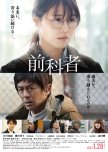
This review may contain spoilers
A perfect end to end off the series
After watching the series, moving directly into a movie was the right call. In the beginning the movie felt like just a tv movie. But as soon as they started adding in elements of the investigation and more background to the main reformed criminal, it felt more like a theatrical movie. That was the distinguishing reason why you could call this a movie rather then an extended special. This distinction is important now due to so many shows going to movie endings. There was just enough extra in this that the movie felt warranted as this was a extra complicated case meant to be taken in one go.The story was a perfect way to end this series. After the first 3 people she helped all dealt with different aspects of criminal history, this movie dealt with the most appropriate unexplored side yet. This movie dealt with the failings of the institutions meant to help those in need: The police, the orphanages, the care workers and the lawyers. Which in contrast to the series was a very smart way to go. Zenkamono came full circle showing all the things capable of creating and sustaining the cycle of victim hood. Covering the failures of the people meant to help those in need was a strong subject that needed to be addressed in a story like this and in glad that they didn't just end up going with another story created by personal issues. As mentioned earlier this is the reason why they needed the extra time to properly represent the many ways in which things can fail.
Kasumi plays her part very strongly in this movie. After a point you can feel that she strongly recognizes what resonates with Kayo and her motivations. The movie finally fully explains what happened to drive Kayo to be a probation officer and how it affected her growing up. In the aftermath we also learn that she became estranged from her former love interest Shinji who has become a police officer due to the same incident she experienced. The contrast between these two greatly affected how they see criminals and rehabilitation. This differing of opinion is very much a reality in this world unfortunately. How others perceive criminals after they have returned to society are at odds with common morality. It's a devastating topic to be explored.
The movie does not shy away from showing scenes of child abuse and crooked cops. These were important in the discussion of how the world can be so cruel and unjust. This allowed for the story to show both sides of the morality. Nothing is ever black and white. The same could be said about our major criminal pair. They had reasonable vengeance expectations but as the movie reiterates, all this does is create more victims in a never ending cycle. The acting for the main brothers was sorta uneven however. They felt the least compelling out of all the characters. The youngest brother was a little too overly dramatic, creating a cartoonish like quality to his character. The main brother also was fairly mute with little body language I found, so it was hard to gauge his acting capability. He did deliver on his final scene however. This didn't overall affect how they were portrayed as abused humans. I just thought they needed a little balance.
Midori makes a return and finishes up her arc with Kayo in a beautiful way. I thought it was sweet that Midori is there to witness Kayo repent for her own crime of stealing a library book in the end. Showing Midori that Kayo isn't some perfect person either. That's just something that stuck with me.
Great overall movie where you don't need to watch the series necessarily but it definitely be more impactful understanding Midori's scenes.
Was this review helpful to you?

This review may contain spoilers
Are we bound by our past mistakes?
Zenkamono deals with heavy subject matter. The main stories are split into 3 separate stories with some overlap. Each one takes a look at how difficult it is for criminals to reintegrate into society after crime.Arimura is the most aggressive that I've ever seen her. She's also at the weakest I've ever seen her in a role. I respected that aspect about her character. It's really explosive sometimes. Sometimes almost comical. She goes through the most extremes I've seen her in terms of character personality.
The first story I felt was the most powerful. Midori and Kato have an amazing chemistry together. I thoroughly enjoyed their interactions and banter. Midori's character arc had an amazing setup and back story with a great payoff. I thought the inclusion of the her childhood trauma and friendships were a good addition to the layers of her character. I felt bad for her circumstances and thought her case was nuanced. I think the strength of this show is how it factors in reasonings for their crimes and how sometimes doing something for the right reasons in their minds lead to the crimes. Midori also added a good balance to restore faith in Kayo every time they interacted.
The second story I thought at first was somewhat odd. Kazu was introduced as a quiet fellow but then when they through in the other layer of his lust, I was surprised. This segment's actor had such amazing body language. He felt awkward and scary. I've met people in real life who have had his posture and mannerisms and it was exquisitely done. The framing of this one was very unexpected and was a good morality question. When we don't agree with someone's morality are we still able to help them? I thought this was an important question to ask in this series. When the end of his story began with the confrontation of his lust and his effect on the other victim, I thought this was some powerful drama. It forces you to understand perspectives on both sides of this story.
The third story was great too! The reframing of the criminal into a victim themselves is something that is a very real occurrence. Allowing Tamiko's character to make poor judgements due to her disposition was a smart way to show the human side of criminals. These people aren't perfect and they themselves know what they did was wrong. But they cannot be shunned from help because of this. Everyone deserves a second chance. Tamiko's fraility and dependence was well communicated in Kotone's acting and body language. They also did excellent work on her makeup to make her look sickly.
The drama on this show is done very well with respect to the subject matter. I would if looked to have seen more in the logistical side of how probation is done. But I think for the human side it was focused well. The cinematography was crisp and movie quality. I can see why they opted for a movie sequel with the series. Enjoyable watch with a little room for more.
Was this review helpful to you?

This review may contain spoilers
A quiet little side quest
For the most part this series is a slice of life show. It doesn't really have any stakes but it does ask some questions about life. It's not deep questions but they are things that sometimes we think about on our days off.For someone to enjoy this, there's a small prerequisite that you already enjoy Kasumi Arimura. This is a fictionalized version of herself, but I could see some of her genuine personality show in many of the scenes. Each episode talks about something interesting. From hidden family drama to health check ups and even opening a jar of kaya jam! i found that each episode was uneven in quality but that was mainly due to the different directors involved. Kore-eda himself directed a episode, which had all of his usual trappings. I found the last two episodes the most enjoyable personally. The story of the young child whose seemingly living with a single parent and the baseball episode was the most eloquently presented in speech and direction I thought. The 2nd episode was a great take down of societal issues in Japan. The third was somewhat odd but it felt very cozy due to the setting. Episode 4 touched on some interesting aspects of celebrity status but it also veered into such a weird space. The Jam episode was also lightly comical but ended with a surprising amount of alienation and solitude. The couple episode was also a little uneven with the themes of inadequacy and relationships. I thought this one was paced very strangely. Therefore I really only enjoyed maybe half the episodes out of the 8.
As for the filming styles, since there was a mix of directors each one felt uniquely distinct in the type of blocking, framing and lighting. The baseball episode felt the most cinematic out of all of the episodes to me. The little girl episode felt the most charming and metaphorical. Episode 1 with Kore-eda had his usual flourishes with long lingering scenes of family activities and careful hand gestures. The health episode I shall warn some that the sounds it creates may make some people uncomfortable. As the sound of ultrasonic gel can be heard smearing around kasumi's stomach for long points in the episode lol. The music was cute. I liked the main title song and ending song. I also enjoyed the little bts polaroids at the end.
It's a nice little distraction of a show honestly.
Was this review helpful to you?

This review may contain spoilers
Time to consider
Sometimes as we go through life we wonder, is this the right path? What if we had time to consider our choices? Would we ultimately be happy?I think this is what the film is trying to explore.In this quiet little area we have many stories playing out with people stuck in decisions that they aren't too happy about, while a panicked staff try to quell their needs. While the chaos is going on, we get little glimpses of intrusive thoughts in each character. The most astounding one is; if you had the chance to experience death, would you take it? This movie brings up a couple of morale qualms in the midst of the comedy. Questions of morality and what we say can have negative effects that carry on and stick with someone. I thought that was the most interesting thing about this film. Being in a time loop is somewhat like how peopled dwell on the same moment over and over in their mind and that can lead to violence sometimes. But overtime we tend to let those moments pass. They will always be a memory there to us, but time heals.
Another impressive thing was the camera and staging! When they moved through so many narrow hallways and created immaculate mirroring it was very impressive. Many times I wondered how they were gonna deviate or try to one up the last sequence. I thoroughly enjoyed that.
Despite these things, there are a couple of negatives. Some characters don't really get any sort of closure. Like the owner and main host. A bit into the movie, I randomly started to hate Mikoto because of her shelfisness.But then I realized that was because of her inability to want to change and move forward. The climax of the movie is really silly. But I suppose that's just Japan for you. The ending is a little unsatisfying but I think that's just a fact of life lol
Either then that though movie is a fun time waster.
Was this review helpful to you?


